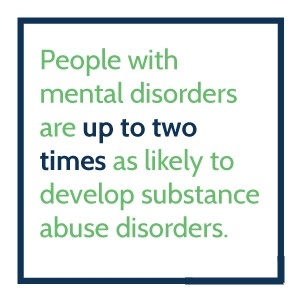What are Anxiety Disorders?
Anxiety is a normal emotion. It’s your brain’s way of reacting to stress and alerting you of potential danger ahead.
Everyone feels anxious now and then. For example, you may worry when faced with a problem at work, before taking a test, or before making an important decision.
Occasional anxiety is OK. But anxiety disorders are different.
They’re a group of mental illnesses that cause constant and overwhelming anxiety and fear. [1] The excessive anxiety can make you avoid work, school, family get-togethers, and other social situations that might trigger or worsen your symptoms.

Get Your Life Back
Find Hope & Recovery. Get Safe Comfortable Detox, Addiction Rehab & Mental Health Dual Diagnosis High-Quality Care at the We Level Up Treatment Centers Network.
Hotline (877) 378-4154What are the Types of Anxiety Disorders?
There are several types [2] of anxiety disorders:
- Generalized Anxiety Disorder – You feel excessive, unrealistic worry and tension with little or no reason.
- Panic Disorder – You feel sudden, intense fear that brings on a panic attack. During a panic attack you may break out in a sweat, have chest pain, and have a pounding heartbeat (palpitations). Sometimes you may feel like you’re choking or having a heart attack.
- Social Anxiety Disorder – Also called social phobia, this is when you feel overwhelming worry and self-consciousness about everyday social situations. You obsessively worry about others judging you or being embarrassed or ridiculed.

- Specific Phobias – You feel intense fear of a specific object or situation, such as heights or flying. The fear goes beyond what’s appropriate and may cause you to avoid ordinary situations.
- Agoraphobia – You have an intense fear of being in a place where it seems hard to escape or get help if an emergency occurs. For example, you may panic or feel anxious when on an airplane, public transportation, or standing in line with a crowd.
- Separation Anxiety – Little kids aren’t the only ones who feel scared or anxious when a loved one leaves. Anyone can get separation anxiety disorder. If you do, you’ll feel very anxious or fearful when a person you’re close with leaves your sight. You’ll always worry that something bad may happen to your loved one.
- Medication-Induced Anxiety Disorder – Use of certain medications or illegal drugs, or withdrawal from certain drugs, can trigger some symptoms of anxiety disorder.
Get Help. Get Better. Get Your Life Back.
Searching for Accredited Drug & Alcohol Rehab Centers Near You? Or Mental Health Support?
Even if you have failed previously, relapsed, or are in a difficult crisis, we stand ready to support you. Our trusted behavioral health specialists will not give up on you. Call us when you feel ready or want someone to speak to about therapy alternatives to change your life. Even if we cannot assist you, we will lead you wherever you can get support. There is no obligation. Call our hotline today.
FREE Addiction Hotline – Call 24/7Anxiety Causes
Anxiety is our body’s natural response to stress. It is a feeling of fear or apprehension about what is to come. But if your feelings of anxiety feel extreme, last for longer than six months, or are affecting your life, you may have an anxiety disorder that may require anxiety treatment. Anxiety is a healthy emotion. However, when a person regularly feels excessive levels of anxiety, it might become a medical disorder.
The American Psychological Association (APA) [3] defines anxiety as “an emotion characterized by feelings of tension, worried thoughts and physical changes like increased blood pressure.” If an anxiety disorder is left untreated, it can have severe consequences. It is best to always seek out help before the worst. Also, Anxiety treatment can help you overcome the symptoms and lead a more manageable day-to-day life.
Anxiety disorder is a medical condition that a variety of professionals can treat. The sooner you start the right anxiety treatment, the better the result you can expect.
Anxiety Disorder Symptoms
- Restlessness, and a feeling of being “on-edge.”
- Increased irritability
- Concentration difficulties
- Sleep difficulties, such as problems in falling or staying asleep.
- Uncontrollable, irrational feelings of fear and worry – that recurs for six months or more
- Sensations of panic and uneasiness for no apparent reason
- A decline in social relationships, social activities, job performance, or overall satisfaction with life
- Repeated failed attempts to resolve one’s fears
- Substance abuse/misuse, self-medication, or other compulsive behaviors such as overeating as a way of managing anxiety symptoms

However, the body has strong physical reactions to the psychological symptoms of anxiety. For instance, these physical responses may include:
- Trouble sleeping or insomnia
- Heart palpitations
- Chest pain
- Choking sensations
- Shortness of breath or rapid breathing
- Muscle tension
- Trembling
- Inability to remain calm
- Stomach pain
- Headaches
- Nausea
- Fatigue
- Rapid breathing, or hyperventilation
- Sweating
- Dry mouth
- Dizziness
- Cold or sweaty hands and feet
- Numbness or tingling in the hands or feet
First-class Facilities & Amenities
World-class High-Quality Addiction & Mental Health Rehabilitation Treatment
Rehab Centers TourRenowned Addiction Centers. Serene Private Facilities. Inpatient rehab programs vary.
Addiction Helpline (877) 378-4154Proven recovery success experience, backed by a Team w/ History of:
15+
Years of Unified Experience
100s
5-Star Reviews Across Our Centers
10K
Recovery Success Stories Across Our Network
- Low Patient to Therapist Ratio
- Onsite Medical Detox Center
- Comprehensive Dual-Diagnosis Treatment
- Complimentary Family & Alumni Programs
- Coaching, Recovery & Personal Development Events
Anxiety Risk Factors
Possible Risk Factors of Anxiety
- Genetics – family history of anxiety or other mental health issues
- Environmental stressors, such as family issues, difficulties at work, or relationship problems
- Medical factors, such as the symptoms of a different disease, the stress of an intensive surgery or prolonged recovery, or the effects of a medication
- Brain chemistry, psychologists define many anxiety disorders as misalignments of electrical signals in the brain and hormones
- Withdrawal from an illicit substance
- History of trauma, such as child abuse or exposure to violence
- Substance abuse: alcohol, drugs or prescription medication misuse can cause changes in the brain chemistry that may trigger or intensify anxiety
- Incidence of other mental health disorders: Pre-existing psychiatric disorders (e.g.: depression) makes people more likely to suffer from an anxiety disorder.

Anxiety Disorder Treatment
Anxiety is not curable, but there are many ways to keep it from being a huge problem. Therefore, getting the proper anxiety treatment will help you dial back your out-of-control worries so that you can get on with life. Effective anxiety treatment helps you learn how to control your anxiety, so it does not control you.
As the symptoms of anxiety are moderate to severe, psychological and/or medical treatments are likely to be required. A range of health professionals and services offer information, support for anxiety conditions, anxiety treatment, as well as several things you can do to help yourself. The important thing is finding the right treatment and the right health professional for your needs.
Some ways to manage anxiety disorders include learning about anxiety, dietary adjustments, exercise, relaxation techniques, correct breathing techniques, learning to be assertive, structured problem solving, building self-esteem, exposure therapy, cognitive therapy, medication, and support groups. The symptoms of anxiety can be both physical and psychological, and addressing these symptoms requires a multidisciplinary approach to anxiety treatment.
The role of family or loved ones is one of the major keys to successful treatment. However, talking to a family member or friends about anxiety can be challenging, especially if substance abuse is involved. Anxiety disorder and addiction are both topics that are very personal and sensitive. But, taking the initiative to express your concern to a loved one struggling with these could be the factor that inspires the person to the next stage of recovery.
Moderate Anxiety Treatment
People with moderate levels of anxiety have more frequent or persistent symptoms than those with mild anxiety, but still have better daily functioning than someone with severe anxiety or panic disorder.
Although moderate anxiety symptoms are disruptive, people with moderate anxiety may have success in managing their anxiety with the help of a doctor or self-help strategies.
Severe Anxiety Treatment
Severe anxiety is intensely debilitating, and symptoms of severe anxiety meet key diagnostic criteria for clinically-significant anxiety disorder.
Severe anxiety symptoms also frequently co-occur with major depression, which can contribute to greater disability. Symptoms of severe anxiety are frequent and persistent and may include increased heart rate, feelings of panic, and social withdrawal. These symptoms can result in loss of work and increased health care costs. In addition, individuals with severe anxiety may turn to alcohol and drugs as a means to cope with their symptoms.
Psychotherapy. Also known as talk therapy or psychological counseling, psychotherapy involves working with a therapist to reduce your anxiety symptoms. It can be an effective treatment for severe anxiety. Cognitive-behavioral therapy (CBT) is the most effective form of psychotherapy for anxiety disorders.
World-class, Accredited, 5-Star Reviewed, Effective Addiction & Mental Health Programs. Complete Behavioral Health Inpatient Rehab, Detox plus Co-occuring Disorders Therapy.
CALL (877) 378-4154End the Addiction Pain. End the Emotional Rollercoaster. Get Your Life Back. Start Drug, Alcohol & Dual Diagnosis Mental Health Treatment Now. Get Free No-obligation Guidance by Substance Abuse Specialists Who Understand Addiction & Mental Health Recovery & Know How to Help.
Anxiety & Stress
If you feel that either stress or anxiety are affecting your day-to-day functioning or mood, consider talking to a mental health professional who can help you understand what you are experiencing and provide you with additional coping tools. For example, a psychologist can help determine whether you may have an anxiety disorder.
Anxiety disorders differ from short-term feelings of anxiety in their severity and in how long they last: The anxiety typically persists for months and negatively affects mood and functioning. Some anxiety disorders, such as agoraphobia (the fear of public or open spaces), may cause the person to avoid enjoyable activities or make it difficult to keep a job. [3]

Anxiety disorders are common. According to the National Institute of Mental Health, 19% of Americans over the age of 18 had an anxiety disorder in the past year, and 31% of Americans will experience an anxiety disorder during their lifetimes.
Anxiety disorders can be treated with psychotherapy, medication, or a combination of the two. One of the most widely used therapeutic approaches is cognitive behavioral therapy, which focuses on changing maladaptive thought patterns related to anxiety. Another potential treatment is exposure therapy, which involves confronting anxiety triggers in a safe, controlled way in order to break the cycle of fear around the trigger.
Anxiety & Alcohol
When alcoholism and anxiety fuel each other, this is known as a dual diagnosis.
If you are diagnosed with alcoholism and anxiety as co-occurring disorders, you don’t want them to go untreated. It’s important to treat both disorders.
The good news is that there are plenty of treatment options available for people struggling with a dual diagnosis, whether it’s consulting a physician, joining a support group like Alcoholics Anonymous (AA), enrolling in a treatment/detox center, or seeking help from a counselor or therapist.
Anxiety & Depression
Depression and anxiety can occur at the same time. In fact, it’s been estimated that 45 percent of people with one mental health condition meet the criteria for two or more disorders. One study found that half of the people with either anxiety or depression have the other condition. [4]
Although each condition has its own causes, they may share similar symptoms and treatments.
Dual Diagnosis Treatment at We Level Up NJ

Substance abuse is more common in people suffering from anxiety disorders than in the general population. It is common for people who suffer from anxiety to self-medicate or misuse alcohol or drugs to find a way to cope with their symptoms. But the alcohol or drugs abuse enhances the effects of anxiety.
This cycle of self-medication and rebound anxiety digs a deeper and deeper hole for the addicted person, making anxiety treatment harder and harder as time goes by. Alcohol and drug use can worsen the physical symptoms of anxiety as well, reinforcing the need to use more of these substances to function normally. The result is only going to be a cycle of substance abuse that can lead to chemical dependence and addiction.
A person with a dual diagnosis has both a mental disorder such as anxiety disorder and an alcohol or drug problem. These conditions occur together frequently. We Level Up NJ Dual Diagnosis treatment center has developed an effective dual therapy program track. It is also a Gold Seal Recipient and an essential provider of dual diagnosis treatment. Our rehab center focuses on the complete treatment required for both illnesses. We treat the entire individual as a whole – their mind, their body, and their soul. Your dual diagnosis treatment teams will provide thorough and comprehensive therapy to you and your family members. We are committed to providing a coordinated and scientific proof-based treatment that works.
At the We Level Up NJ treatment center, we provide world-class care with round-the-clock medical professionals available to help you cope. All working as a team providing primary SUD treatment along with primary substance abuse and co-occurring secondary Anxiety treatment for successful recovery. Make this your opportunity to reclaim your life. Call today to speak with one of our treatment specialists. Our counselors know what you are going through and will answer any of your questions. Your call is private and confidential and there is never any obligation.
Experience Transformative Recovery at the We Level Up Treatment Center.
See our authentic success stories. Get inspired. Get the help you deserve.



Start a New Life
Begin with a free call to an addiction & behavioral health treatment advisor. Learn more about our dual-diagnosis programs. The We Level Up treatment center network delivers various recovery programs at each treatment facility. Call to learn more.
- Personalized Care
- Caring Accountable Staff
- World-class Amenities
- Licensed & Accredited
- Renowned w/ 5-Star Reviews
We’ll Call You
Sources:
[1-2] Anxiety Disorders – https://www.webmd.com/anxiety-panic/guide/anxiety-disorders
[3] Anxiety American Psychological Association (APA) https://www.apa.org/search?query=anxiety
[4] Depression and Anxiety – https://www.healthline.com/health/mental-health/depression-and-anxiety
[5] We Level Up – Mental Health » Anxiety Treatment
